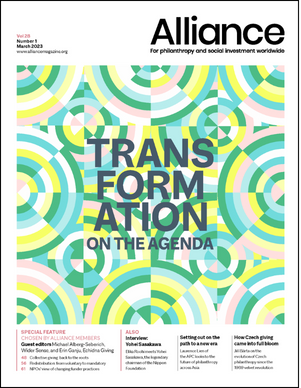The truth of philanthropy’s intentions is contained in actions, not words
From the pandemic to nuclear and technological threat, inequality and climate change, we are confronted with a polycrisis, many elements of which are rooted in our predominant economic and social mode, which poses an existential threat to humanity.
What does this mean for philanthropy? Some might say, nothing. Challenges evolve, new ones appear, and philanthropic actors are doing their work on what is of interest to them in the best way they can. But can we practise the love of humanity – the original meaning of philanthropy – and ignore the existential threats it is facing? We believe not. This does not mean all philanthropic actors should follow the same agenda and priorities. Philanthropy has and should have as many forms as there are philanthropic actors. But given the present moment, we believe that all of them, regardless of their size and mission, should urgently revisit their ways of working. Each of us should ask ourselves how we can contribute to bringing about the kind of transformation the world needs to overcome the threats we are grappling with.
But can we practise the love of humanity – the original meaning of philanthropy – and ignore the existential threats it is facing? We believe not.
For some, it may be through a new way to trust the communities they support, for others it may be by making sure the schools they build are climate-friendly and contribute to the local economy, for others still it may be through a better alignment of their investments with their social mission. In all cases, it is about understanding that to transform our world we need to transform ourselves and look inwards. Many are already reflecting and acting, and we can learn from them.
Some of the questions we can ask ourselves on this journey include: are we paying enough attention to cross-cutting issues such as climate and equity; are we using all our assets – financial and non-financial – to make the difference we want around us; are we consistent in our mission and values across all dimensions – governance, management, relationships, influence, investments, and the way we produce wealth in the first place; are we using all the means that can increase our effectiveness; are we contributing to developing new models that lay the foundations for a more resilient and sustainable future?
As a network of close to 200 changemakers and philanthropy developers across nearly 60 countries, WINGS has decided to start a new initiative called Philanthropy’s Transformation to encourage our field to engage in such reflections and access the existing resources and ideas within the philanthropy sector that can guide donors across the spectrum of philanthropy towards transformation. We have immense power in our hands which we must use to ensure that we not only achieve our individual goals today but that we remain able to achieve our missions tomorrow. To further these aims, we established an advisory group of prominent philanthropy practitioners including academic centres such as the Stanford Center on Philanthropy and Civil Society (PACS), individual philanthropists from emerging economies and leaders of key global players such as Giving Tuesday. We’ve also commissioned research and analysis that will lead to the design of a set of recommendations about key principles and actions for philanthropy’s transformation. The high-level principles guiding the work are to act as an enabler of others, to align our assets and to integrate the big global issues threatening humanity into our work.
Each of us should ask ourselves how we can contribute to bringing about the kind of transformation the world needs to overcome the threats we are grappling with.
We will also create an online community of practice that will harness our collective intelligence by curating best practices, ideas, reflections and research from across the sector and that will encourage capacity-building, collaboration and support.
Thus far, initial desk research has been completed, a diverse team has been established and has had several online meetings, several principles have been defined, a partnership has been established with the Centre for Strategic Philanthropy at Cambridge University and there’s been a launch of the project with WINGS members and case collection has started.
We have immense power in our hands which we must use to ensure that we not only achieve our individual goals today but that we remain able to achieve our missions tomorrow.
Historically, we’ve seen how groups of very different approaches and objectives have been able to unite at times of great adversity. Can we imagine a coming together of the field, in all its diversity, beyond partisanship, under the common banner of transformation? What is at stake is no less than our common future. The #PhilanthropyForClimate movement that aims at engaging our broader sector in climate action and which already has more than 600 signatories around the world, many of whom are non-climate funders, is proof that we can come together and transcend our individual missions and take action. And this is because acting on the climate emergency is a condition for all the rest of our philanthropic work to continue.

‘Philanthropy’s Role in Realising the Localisation Agenda’, run as a side event at the UN General Assembly. Credit WINGS
Our hope is that we can show that our field has started the journey and prove wrong those who think that philanthropy is merely effective at maintaining the status quo.
Can we imagine a coming together of the field, in all its diversity, beyond partisanship, under the common banner of transformation? What is at stake is no less than our common future.
Networks and support organisations that WINGS brings together have a crucial role to play, not only by continuing to serve donors in their work but by leading and influencing our field and the norms that shape it. This is our greatest hope: that we harness, amplify and extend the progress philanthropy is making towards building a new future in which people and the planet thrive. One in which our love of humanity remains of the highest value.
Benjamin Bellegy is executive director at WINGS.
Email: bbellegy@wingsweb.org
Twitter: @BenBellegy








Comments (0)